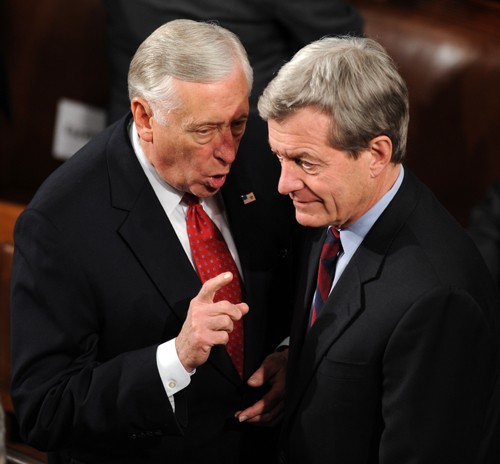WASHINGTON — The battle over who will be the No. 2 leader of weakened House Democrats in the next Congress took on racial overtones Monday as Majority Leader Steny Hoyer, who is white, and Majority Whip Jim Clyburn, who is black, battled for supporters.
Rep. Barbara Lee of California, who chairs the 41-member Congressional Black Caucus, told colleagues in a letter that it’s important to keep an African-American on the party’s House leadership team. Rep. Bobby Rush, an Illinois African-American, sent a separate letter backing Clyburn for the post.
Thirty House Democrats — none of them black — sent colleagues their own letter soliciting support for Hoyer, who has served in Congress for three decades.
The internal leadership contest between Hoyer, a convivial lawmaker from Maryland, and Clyburn, a South Carolinian who is the highest-ranking black member of Congress, was sparked by House Speaker Nancy Pelosi’s decision to seek the House minority leader job in the new Congress. Because her party will no longer be in the majority in January, she’ll lose her speaker’s position.
“”With our country and our party at a crossroads, it is important that we have a leadership team in place that recognizes the strength and diversity of the Democratic caucus,”” Lee wrote in her appeal for Clyburn.
“”Steny Hoyer has an important role to play in defending the accomplishments of this Congress, resisting Republican efforts that would weaken our middle class and rebuilding a Democratic majority,”” the 30 lawmakers wrote in their letter.
The 30 Hoyer supporters include seven Hispanic members, among them Reps. Linda Sanchez, Joe Baca, Dennis Cardoza and Lucille Roybal-Allard of California, and Silvestre Reyes of Texas.
“”You may find the politics of race dictates a lot of what happens,”” Michael Franc, an analyst at the Heritage Foundation think tank in Washington, said.
Hoyer formally declared his candidacy for minority whip Monday in a letter to his House peers.
“”I have been encouraged by the number of my fellow Democrats who have urged me to remain the second-ranking member of our leadership team in the House,”” he wrote.
Denying Clyburn a leadership post would offend many members of the Congressional Black Caucus, who will make up more than one-fifth of House Democrats in the next legislative session.
“”It (would) send a bad signal to the country, especially leading into a presidential election where African-American turnout is important to Democrats,”” said Darrell West, a government analyst with the Brookings Institution think tank in Washington.
President Barack Obama will be heavily dependent on black voters in his 2012 re-election bid.
Rep. Chris Van Hollen of Maryland, who headed the Democratic Congressional Campaign Committee, suggested that the party might create a House post in order for Hoyer and Clyburn to both remain in the leadership.
“”We’re going to look for a way to make sure that both these members can stay in the Democratic leadership,”” Van Hollen told CNN on Sunday.
Clyburn defended Pelosi’s decision to remain the party’s top House leader over some Democratic lawmakers’ protests that she’s too much of a target for Republicans as a San Francisco liberal — and that she shares some blame for the Republican election rout.
“”My party feels that this had nothing to do with Nancy Pelosi’s leadership,”” Clyburn said of the voting returns that saw Republicans gain 60 House seats, with nine races still too close to call.
“”It had everything to do with an economy that was close to collapse,”” Clyburn said.









